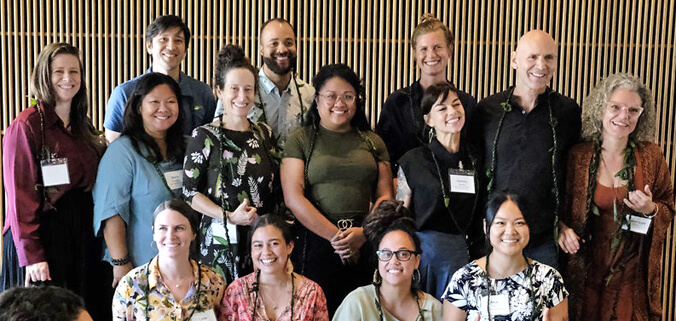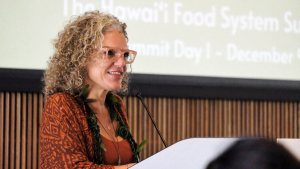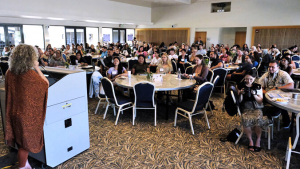
About 200 attendees gathered at the University of Hawaiʻi–West Oʻahu in December for the 3rd Annual Hawaiʻi Food System Summit, hosted by the Transforming Hawaiʻi’s Food Systems Together (THFST) initiative. The summit spotlighted strategies to end hunger, promote equity, and strengthen Hawaiʻi’s food system resilience.
“Recognizing food as a human right transcends political and economic ideologies,” said Albie Miles, THFST co-director and UH West Oʻahu associate professor of Sustainable Community Food Systems. “It speaks to the core values of human equality, aloha and kuleana (responsibility) that define us as a moral society.”
Participants included agriculture professionals, policymakers, food access coordinators, nonprofit leaders, kūpuna (elders) and youth. Together, they explored solutions such as universal free school meals, expanding SNAP benefits, and integrating “food is medicine” programs into healthcare.
“The consequences of hunger extend far beyond the dinner table—it impacts health, education and community well-being,” said Gov. Josh Green, in a video address. “This summit is a crucial step toward achieving a hunger-free Hawaiʻi.”
Attendees also discussed legislative priorities for 2025, offering input on the interagency food system plan led by the Hawaiʻi Department of Agriculture.
THFST, supported by the U.S. Department of Agriculture, W.K. Kellogg Foundation and other partners, fosters statewide collaboration to build a robust and sustainable food system. This year’s summit renewed calls for collective action to combat food insecurity across the islands.
For more information about the summit and its initiatives, visit www.transforminghawaiifoodsystem.org. Event photos are available in the UH West Oʻahu Flickr album, and additional highlights can be found in the post-summit recap.
For more visit Ka Puna O Kaloʻi.
—By Zenaida Serrano Arvman



